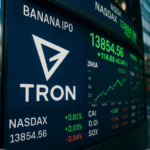Now Reading: Crypto and Fintech Groups Unite Against Big Banks Over Open Banking
-
01
Crypto and Fintech Groups Unite Against Big Banks Over Open Banking
Crypto and Fintech Groups Unite Against Big Banks Over Open Banking

WASHINGTON, Oct. 21, 2025 – A new and powerful coalition of financial innovators is drawing a battle line against America’s largest banks. In fact, in a significant escalation, advocacy groups spanning the cryptocurrency, fintech, and retail sectors have united to fight incumbent banks over the future of open banking crypto fintech regulations. This clash, centered on the Consumer Financial Protection Bureau’s (CFPB) pivotal open banking rule, will ultimately determine who controls consumer financial data.
The core of the dispute is Section 1033 of the Dodd-Frank Act. Indeed, this provision grants consumers the right to access and share their own financial data. The CFPB finalized a rule to enforce this right in late 2024. However, banking giants immediately challenged it in court, citing security risks and high compliance costs.
Now, with the CFPB in the process of rewriting the rule, the new coalition is mobilizing. It is pushing back against bank-led efforts to, as they see it, weaken the rule. Ultimately, at stake is the ability for consumers to safely link their bank accounts to third-party budgeting apps, payment processors, and digital asset exchanges.
Banks want to gut the Open Banking Rule (1033) so they can tax and control your financial data and remove your freedom to choose the services you want. This is bad for crypto and financial innovation in America.
— Tyler Winklevoss (@tyler) October 20, 2025
Now is your chance to speak up by submitting a comment letter (link…
The Push for Fair Access in Open banking Crypto Fintech
This emerging alliance sees the banks’ moves as a direct threat to competition. As a result, the coalition, which reportedly includes the Blockchain Association, the Financial Technology Association, and the Crypto Council for Innovation, is lobbying the CFPB to hold a firm line.
Their primary demand is clear: Prohibit banks from charging fees for data access.
“The nation’s largest banks want to roll back open banking… and crush competition to protect their position in the marketplace,” the Financial Technology Association stated in a recent filing.
Furthermore, fintech and crypto leaders argue that such fees would be disastrous for innovation. They claim it would create a “pay-to-play” system. This, in turn, could make it impossible for startups to compete with established players. Consequently, consumers would face fewer choices and higher costs.
The Incumbent Counter: Stability Over Speed
The big banks, meanwhile, represented by groups like the Bank Policy Institute (BPI), frame the issue differently. They argue that the CFPB’s original rule overstepped its authority and also created serious security vulnerabilities.
For instance, incumbents insist their role is to protect consumers’ privacy and financial stability. They have warned that unfettered, standardized access to third-party apps, especially in the crypto space, could expose customers to fraud and data breaches.
The BPI has also pointed to perceived “mixed messages” from the fintech industry. Specifically, banks argue that while innovators demand free data access, they are less clear on who should bear the liability when a data breach occurs. This stability-first argument understandably resonates with regulators wary of disrupting the financial system.
Open Banking Crypto Fintech: The Regulatory Fault Line
The CFPB is now caught in a regulatory crossfire. The agency paused its legal defense of the original rule in July to initiate this new rulemaking process. In fact, the public comment period is reportedly closing this week, forcing all sides to make their final arguments.
Will regulators prioritize the innovation and consumer choice promised by the fintech sector? Or will they heed the stability and security warnings from the banking giants?
The stakes extend far beyond Washington. For example, a restrictive rule may entrench the dominance of traditional banks. This could then slow the development of open banking crypto fintech services in the U.S. Conversely, a rule favoring open access could unleash a wave of innovation. Yet, it would also place immense pressure on regulators to manage the new risks.
As one industry insider noted, the U.S. already lags behind the U.K., Brazil, and the E.U. in implementing open banking. Therefore, where this rule lands remains unclear, but the outcome will undoubtedly shape the American financial landscape for the next decade.
Recap: The Open Banking Battle
- The Fight: New tech and crypto groups are fighting big banks over a government rule (Section 1033) about sharing your bank data.
- Tech/Crypto Side: They want you to have free, easy access to your own data. They say banks want to charge fees that will stop new apps and hurt customers.
- Big Bank Side: Banks say the new rule is risky and could lead to fraud. They want more control to keep customer accounts safe.
- What’s Next: The government (CFPB) is rewriting the rule right now. Its final choice will decide who controls your financial data.
















